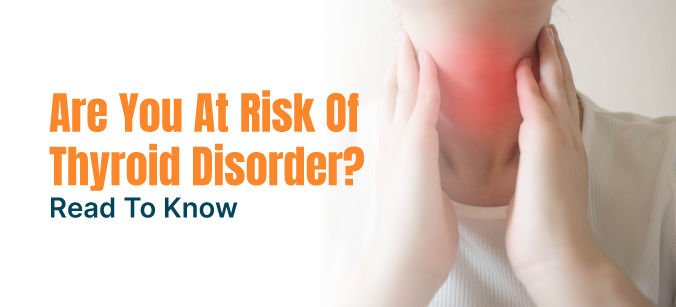General Health
10 Most Googled Questions On Thyroid Answered By An Apollo Expert
5 min read
By Dr Saptarshi Bhattacharya, Endocrinologist, Apollo Hospitals Indraprastha, Delhi - 16 May 2022, Updated on - 08 June 2023
Share this article
0
21 likes

Have you been gaining weight despite eating healthy? Well, then it can be more than just diet and exercise. Unlike popular beliefs, several factors, such as the levels of thyroid hormone, play a role in maintaining a healthy weight. But what is thyroid? How does it affect our body? Questions like these often cross our minds but go unanswered. Not anymore! Here are 10 most googled questions associated with thyroid disorder, answered by none other than Dr. Saptarshi Bhattacharya, Senior Consultant, Department of Endocrinology, Indraprastha Apollo Hospitals.
1. What is a thyroid? What are its functions?
The thyroid is a small butterfly-shaped gland present in front of the neck. Its principal function is the synthesis, storage and secretion of hormones called thyroxine (T4) and triiodothyronine (T3), often together referred to as thyroid hormones. These hormones regulate:
- Metabolism (including cholesterol metabolism)
- Growth
- Reproductive system
- Foetal development
The levels of thyroid hormones are regulated with the help of thyroid-Stimulating hormone (TSH). Ignoring elevated levels of TSH for too long can lead to an imbalance in your cholesterol metabolism, thereby increasing the risk of cardiovascular diseases.
2. What are the different varieties of thyroid disorders?
There are two types of thyroid disorders related to the functional aspect (hormone production) of the gland. If the thyroid gland is producing more hormones than required by the body, it is called hyperthyroidism. If the production of hormones is less than the body’s required levels then it is known as hypothyroidism. The most common type of thyroid disorder is hypothyroidism, where hormone production goes down. Then, there is a structural disorder of the thyroid gland marked by an increase in its physical size, it is known as goitre. Other than these there is a possibility for the thyroid to develop some kind of nodules, 90% of the time these nodules are benign but there is that 10% chance of them being cancerous.
3. What is hypothyroidism?
If the production of hormones is less than the levels required by the body for its healthy functioning, it is known as hypothyroidism. The disorder affects the body and its physiology in different ways, some of which include:
- Slow metabolism
- Weight gain
- Intolerance towards cold
- Slow heart rate
- Menstrual irregularities
- Miscarriage
- Derangement in cholesterol
- Dryness of skin
4. What is hyperthyroidism?
If the thyroid gland is producing more hormones than the levels needed for the healthy functioning of the body, then the patient is suffering from hyperthyroidism. One of the main causes of the disorder is Grave’s Disease. Hyperthyroidism affects the body and its physiology in different ways, some of which include:
- Faster metabolism
- Weight loss
- Increased heart rate
- Increased bowel movement
- Increased sweating
- Bulging of eyes
5. Does a Thyroid Problem Cause Weight Gain?
A thyroid disorder is diagnosed by studying the rise or fall in the levels of T3, T4 and compensatory rise in Thyroid-Stimulating Hormone (TSH). The rise in compensatory TSH confirms hypothyroidism whereas, a dip in the levels confirms hyperthyroidism. Contrary to popular beliefs, weight gain due to hypothyroidism is very limited, maybe only 3 to 5kgs. The more obvious reasons for one’s weight gain could be their lifestyle choices.

6. How long does one have to take thyroid medications?
Extremely high levels of TSH (higher than 10) may indicate that damage to the thyroid gland. The possible reasons for this damage include:
- An autoimmune disease which further builds up the risk of damage to the other organs
- Surgery
- Permanent removal of the gland
These damages make deficiency of thyroid hormone permanent, making medication a long term if not a permanent necessity. The prescribed medications are withheld only during pregnancy, but if post-pregnancy the derangement in hormone level is minimal, medication can be stopped depending on the doctor's recommendation.
7. Do we need to change our salt intake after the diagnosis of a thyroid problem?
No, the average salt intake is 5g to 6g per day and it can go upto 10g per day for non-hypertensive people. We can continue the same variety of salt and preferably an iodised one.

8. Can cabbage and cruciferous vegetables be ingested for thyroid disorders?
Yes, cruciferous vegetables like cabbage and broccoli consumed in the Indian traditional diet are safe for use. It's a myth that consumption of cruciferous vegetables affects the thyroid which comes from parts of Africa where these vegetables are considered a staple food.
9. How is thyroid swelling treated?
There are two ways thyroid swelling is detected. If on observation one finds a physical increase in the size of the gland or through an ultrasound. If the required screening confirms a nodule or swelling, You need to see your doctor! In 90% of the cases, the swelling is non-cancerous but further testing is needed to figure out the nature of the nodule or the swelling.

10. What is thyroid cancer?
Thyroid cancer is one of the treatable forms of cancer if detected early. To confirm the diagnosis, the doctor may perform a biopsy, followed by the required treatment.
General Health
Leave Comment
Recommended for you

General Health
Methylcobalamin Injection: Strategies for Effectively Managing Vitamin B12 Deficiency
Explore how to effectively manage and treat vitamin B12 deficiency through diet, supplements (methylcobalamin injection) and lifestyle changes.

General Health
Your Smartphone Can Be The Reason For Your Declining Health! Know How
Mobile phones are the need of the hour, however, they can lead to several health concerns. Read to know more about it.

General Health
7 Symptoms Of Hypothyroidism You Must Not Ignore
Hypothyroidism is a medical condition that occurs when the thyroid gland is not producing enough thyroid hormone, leading to various symptoms such as fatigue, weight gain, and cold intolerance. This article outlines the common symptoms of hypothyroidism and when you should consult a healthcare professional.
Subscribe
Sign up for our free Health Library Daily Newsletter
Get doctor-approved health tips, news, and more.
Visual Stories

Plant-based Foods That Are a Great Source of Iron
Tap to continue exploring
Recommended for you

General Health
Methylcobalamin Injection: Strategies for Effectively Managing Vitamin B12 Deficiency
Explore how to effectively manage and treat vitamin B12 deficiency through diet, supplements (methylcobalamin injection) and lifestyle changes.

General Health
Your Smartphone Can Be The Reason For Your Declining Health! Know How
Mobile phones are the need of the hour, however, they can lead to several health concerns. Read to know more about it.

General Health
7 Symptoms Of Hypothyroidism You Must Not Ignore
Hypothyroidism is a medical condition that occurs when the thyroid gland is not producing enough thyroid hormone, leading to various symptoms such as fatigue, weight gain, and cold intolerance. This article outlines the common symptoms of hypothyroidism and when you should consult a healthcare professional.